9 HR Challenges in the Hospitality Industry
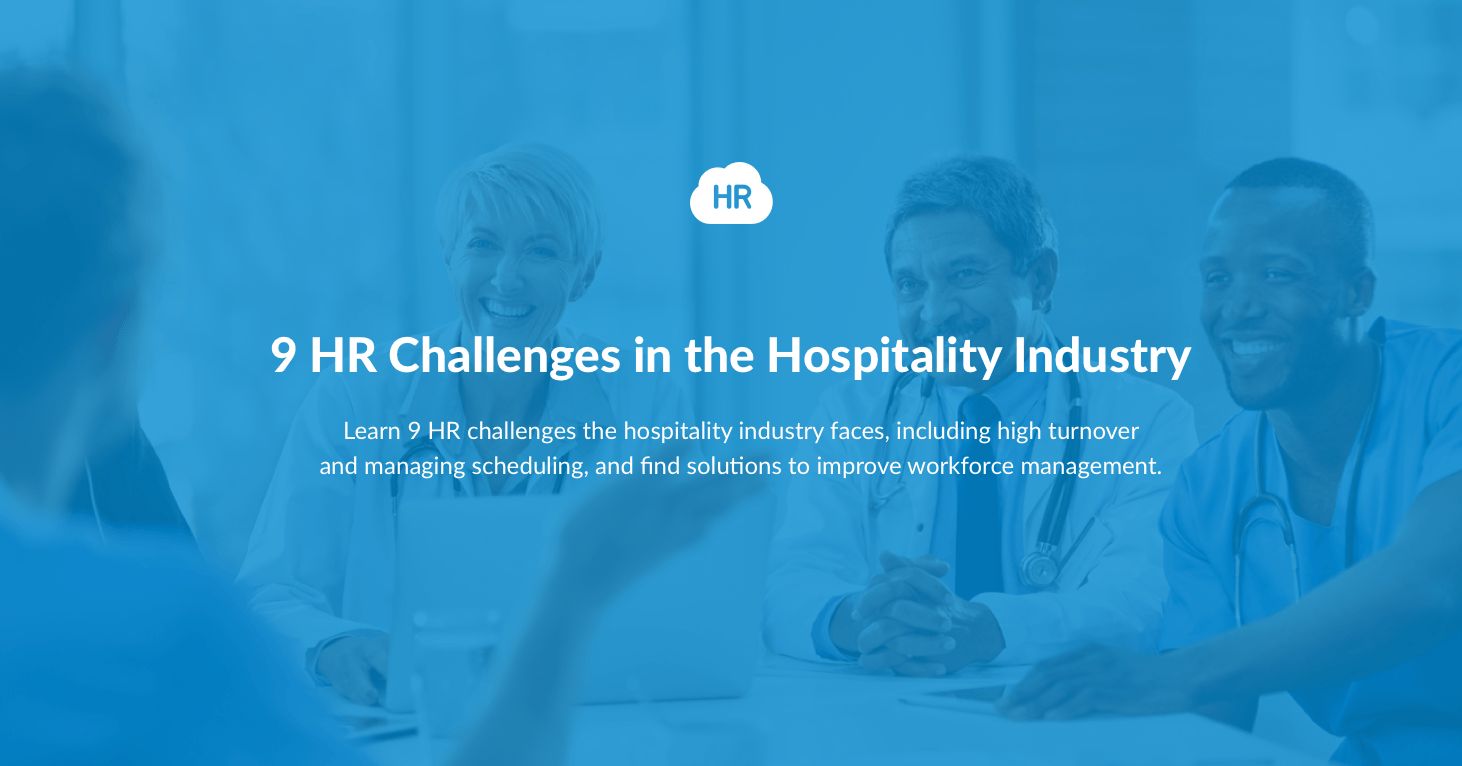
- 1. High staff turnover rates
- 2. Difficulty recruiting skilled employees
- 3. Evaluating employee performance
- 4. Managing employee scheduling
- 5. Employee engagement
- 6. Ensuring employee safety and security
- 7. Compliance with employment laws and regulations
- 8. Implementing effective training programs
- 9. Fostering diversity and inclusivity in the workplace
- Prioritize HR Management Strategies


 Cut onboarding time
by 60%—here's the
Ultimate Checklist
that helped do it.
Cut onboarding time
by 60%—here's the
Ultimate Checklist
that helped do it.

Human resources (HR) are essential in the hospitality industry to guarantee high service quality and guest satisfaction. Hospitality HR departments must ensure that the appropriate people are hired, trained, and supported to fulfill this expectation.
HR is also accountable for upholding employment laws and regulations. This includes creating policies and procedures that promote a safe, inclusive workplace, as well as dealing with employee complaints and disciplinary actions.
Hospitality HR is accountable for managing employee compensation and benefits, creating training programs to enhance employees' skill sets and performance, as well as advocating diversity and inclusion within the workplace. If you're looking to streamline your HR process, take a look at our HR software solutions.
In this article, we'll review nine HR challenges in the hospitality industry and offer solutions to address them.
9 HR Challenges in the Hospitality Industry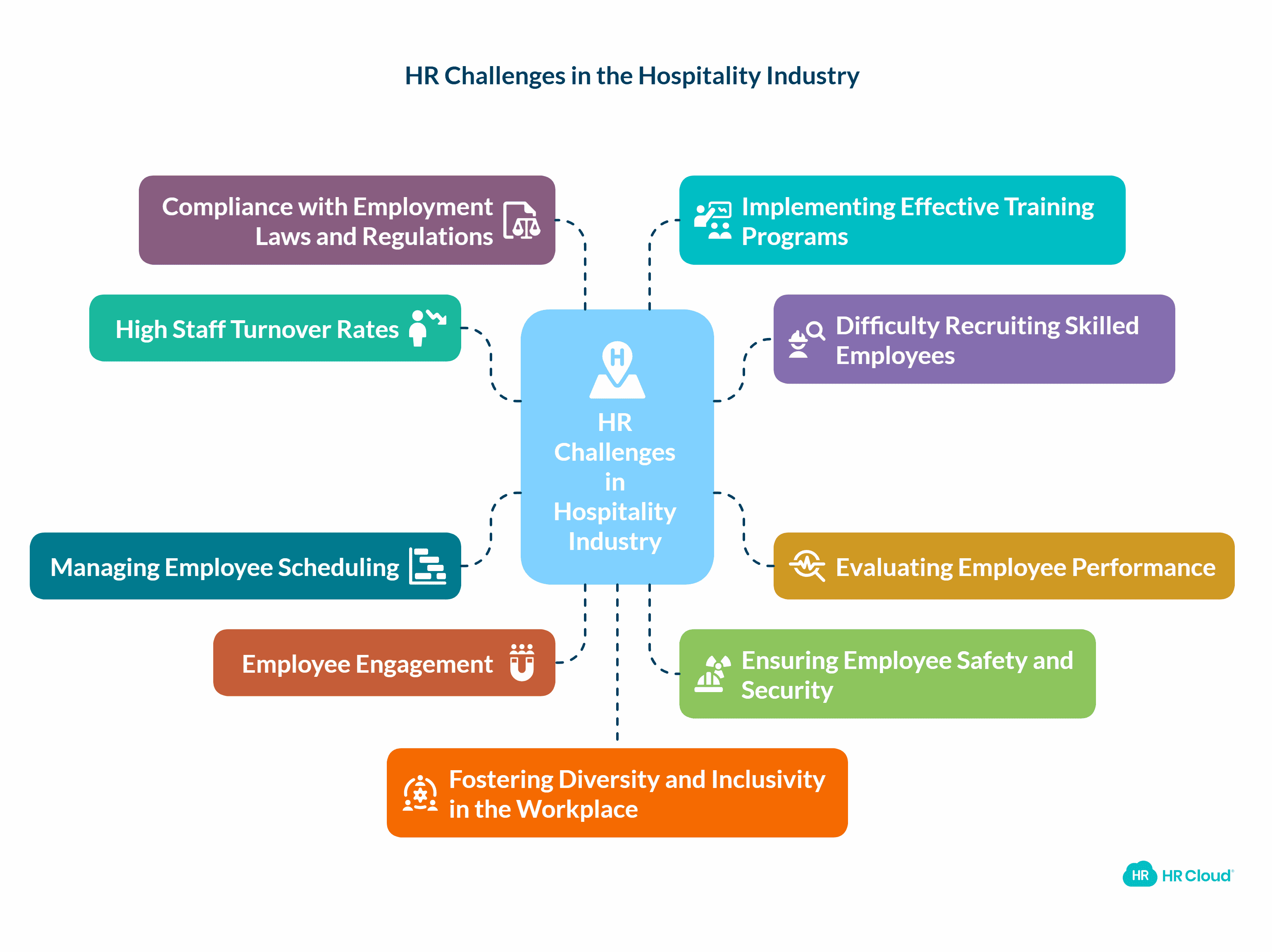
1. High Staff Turnover Rates
High employee turnover rates pose a major obstacle for HR managers in the hospitality industry. As per the Bureau of Labor Statistics, the employee turnover rate in the hospitality industry in 2020 was a staggering 130.7%. This high turnover results in increased recruitment and training expenses for hotels and restaurants alike.
One way to reduce staff turnover is by improving the work environment. You can do this by providing fair salaries, training opportunities, and recognition programs for employee recognition and communication. Implementing employee referral programs can also help in attracting and retaining quality staff.
2. Difficulty Recruiting Skilled Employees
In the hospitality industry, recruiting skilled employees is a significant challenge. Many positions necessitate specialized knowledge, and there are often insufficient qualified applicants available.
Companies can offer competitive salaries, benefits, and a strong employee value proposition to attract skilled employees. Furthermore, the use of Voice over Internet Protocol (VoIP) caller technology—VoIP caller meaning making voice calls over the internet—can facilitate remote interviews, allowing HR personnel to interview candidates situated in different regions without incurring travel expenses. This helps streamline recruitment processes and expands the pool of potential candidates, improving the quality of hire.
3. Evaluating Employee Performance
In the hospitality industry, measuring employee performance can be a real challenge. Many positions require an exceptional level of customer service, making it difficult to evaluate and monitor employee progress in these roles.
Companies should offer regular feedback and training opportunities to manage employee performance. Establishing clear customer service standards and performance goals helps employees understand your expectations. Technology such as HR software with performance management system features can allow HR managers to track employee progress and provide constructive criticism.
4. Managing Employee Scheduling
HR managers in the hospitality industry often face a time-consuming challenge when it comes to scheduling employees effectively. However, by employing specific strategies and technologies, HR managers can streamline employee scheduling for greater efficiency.
One effective way to manage employee scheduling is through scheduling software. This type of program can be tailored specifically for the hospitality industry, allowing managers to create flexible work schedules that take into account factors like peak business hours, employee availability, and labor costs. With HR managers' help, optimizing staffing levels, reducing the risk of overstaffing or understaffing, and assigning each employee to an ideal shift becomes much more straightforward.
5. Employee Engagement
Employee engagement is a significant issue in the hospitality industry. Many employees lack motivation and don't feel connected to their jobs or company, leading to reduced productivity levels, poor customer service experiences, and high turnover rates. This can have serious repercussions for companies in this space.
Companies can improve employee engagement by offering regular feedback and recognition to staff. Employee pulse surveys are also a great way to get insights. Furthermore, companies must involve employees in decision-making processes as well as offer them opportunities for career growth. Utilizing technology to transfer files remotely can also facilitate collaborative working environments where staff feel more engaged with their work. 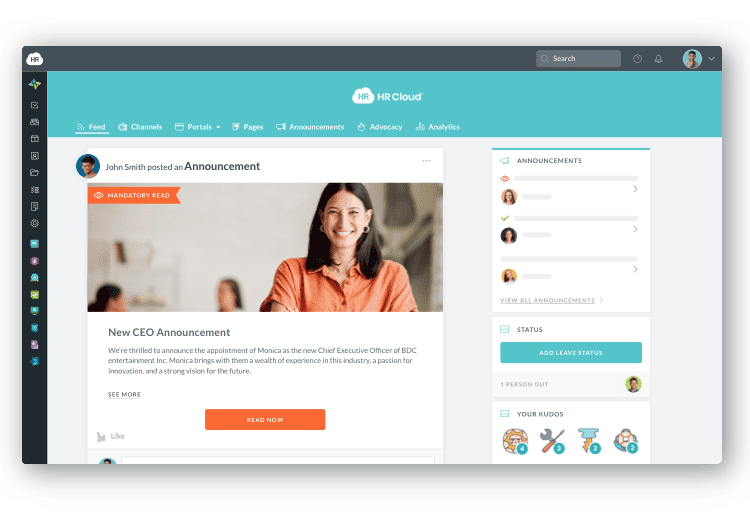
6. Ensuring Employee Safety and Security
The hospitality industry often involves high-risk situations, such as handling cash, dealing with intoxicated guests, and working in isolated areas. HR must make sure employees receive training on how to handle these scenarios safely and that proper safety and security measures are in place. This can include installing security cameras and emergency communication systems, as well as training employees on how to respond in emergency scenarios.
HR managers can implement anti-harassment policies and procedures that encourage employees to report any safety or security concerns. By guaranteeing employee safety and security, the company can protect its staff members as well as its reputation, ultimately providing a better guest experience.
7. Compliance with Employment Laws and Regulations
In the hospitality industry, adhering to employment laws and regulations is paramount. Unfortunately, keeping up with ever-changing rules can prove a daunting challenge for HR managers.
Thankfully, employee payroll software can assist in upholding employment laws and regulations. HR managers can take advantage of both general compliance software and payroll software for restaurants to automate compliance checks and minimize the chances of errors or non-compliance.
In addition to using payroll software, HR managers should regularly review and update their policies while offering training to employees about their rights and responsibilities. Combining payroll software with employee education can ensure that the company's HR processes run smoothly and effectively. This reduces the potential for costly mistakes and legal issues due to non-compliance with employment laws and hospitality regulations. HR Cloud offers payroll integrations which you can check out here.
8. Implementing Effective Training Programs
Implementing effective training programs is paramount in the hospitality industry due to high turnover rates. A comprehensive training program will guarantee that employees are taught correctly and efficiently, helping ensure that employees become successful professionals.
Companies should utilize a range of training methods, including on-the-job learning, e-learning, and career development programs, to deliver effective training. Cross-training employees in different roles can also enhance their skills and provide more flexibility in staffing. Companies should also offer regular educational opportunities to employees so they remain knowledgeable about new processes and procedures.
9. Fostering Diversity and Inclusivity in the Workplace
Diversity is essential in the hospitality industry, where many hotels and restaurants cater to customers from around the world. Therefore, creating an inclusive environment and having a diverse workforce that understands and caters to these needs is paramount.
Companies should ensure equal opportunities for all employees regardless of gender, race, or religion. Furthermore, you should provide training on diversity and inclusion to all staff members to help them understand different cultures and perspectives.
Companies can collaborate with local organizations to recruit employees from diverse backgrounds. Doing so helps create a more inclusive workplace and enhances the company's reputation as an inclusive employer.
Prioritize HR Management Strategies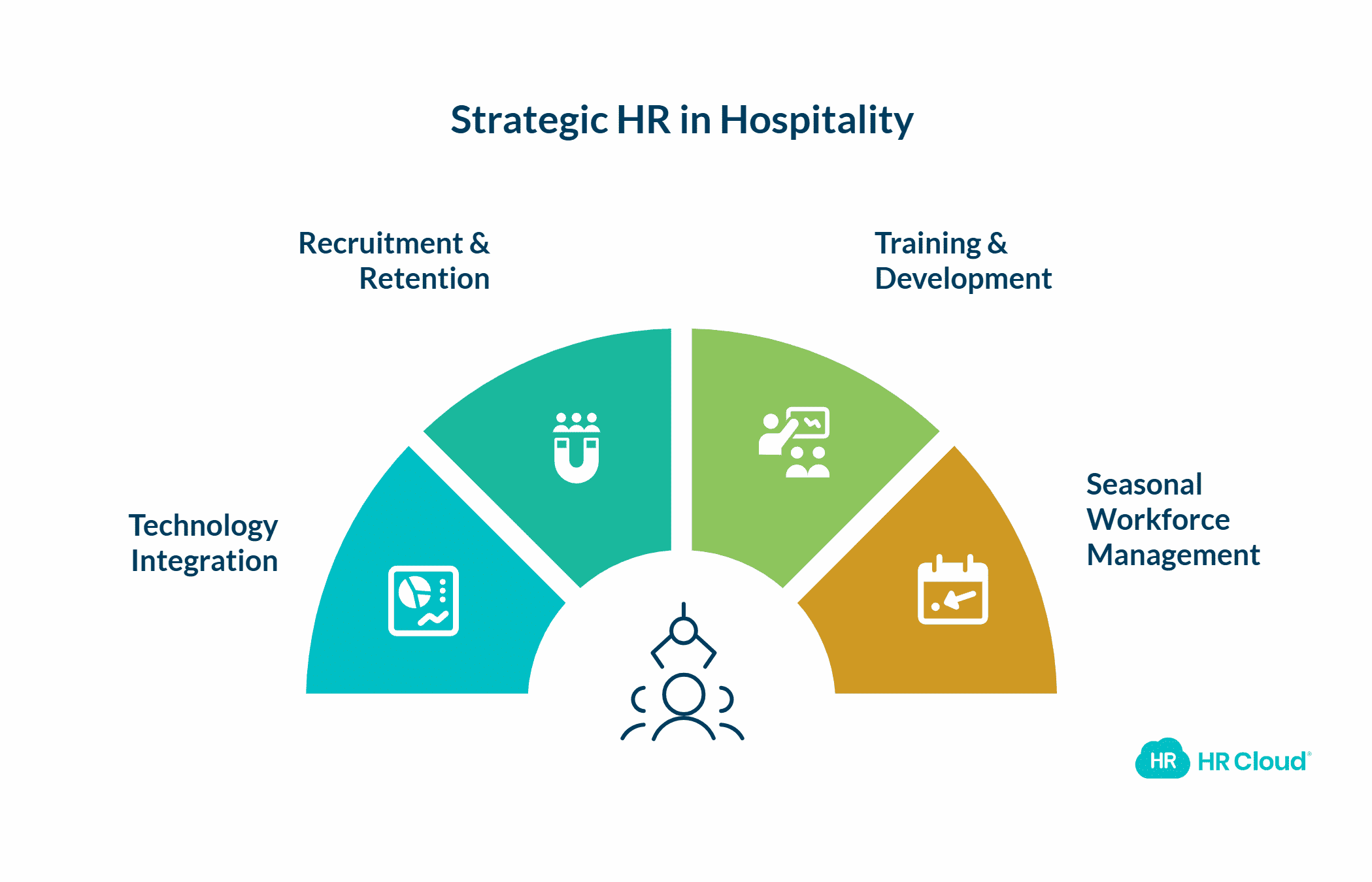
In today's hospitality industry, HR challenges can have a significant impact on employee morale and customer satisfaction. Businesses need to prioritize HR management strategies that will drive success within their organization. This will help them to remain competitive in an increasingly demanding market where customers expect high levels of service.
Firstly, HR management in the hospitality industry must utilize technology to work more efficiently and effectively. For instance, streamlined onboarding, employee intranet, VoIP technology, remote file transfer, and payroll software can simplify internal processes, reduce administrative workloads, and enhance communication between employees and customers. These technological solutions also improve data security and the accuracy and speed of data entry.
Secondly, effective HR management is essential for the hospitality industry's success. Companies need to create a work environment that attracts skilled employees while offering outstanding customer service. You can do this by implementing comprehensive recruitment and retention strategies, providing regular training and development opportunities, and using modern technology. Hospitality HR departments should also focus on seasonal workforce management and addressing seasonal hiring demands to ensure workforce stability throughout the year.
In turn, these HR strategies will drive business growth, boost customer satisfaction levels, and foster loyalty among customers and employees alike.
FAQ's
1. What tools can help manage HR in hospitality?
Tools like HR management software, scheduling platforms, payroll integrations, and performance tracking systems help streamline operations and reduce manual errors.
2. How do you handle seasonal hiring in the hospitality sector?
Companies should use scalable onboarding workflows, flexible contracts, and cross-training to efficiently manage seasonal fluctuations and ensure workforce readiness.
3. What are best practices for employee engagement in hotels or restaurants?
Regular feedback, peer recognition, career development, and involving employees in decision-making help boost engagement and job satisfaction.
4. How can hospitality HR ensure legal compliance?
By using payroll and compliance software, regularly updating policies, and educating employees about their rights and workplace responsibilities.
5. How do hospitality companies promote diversity and inclusion?
Through inclusive hiring practices, diversity training, and partnerships with local organizations to attract a broad talent pool that reflects the customer base.
6. Why is HR important in the hospitality industry?
HR plays a critical role in hiring, training, and retaining employees who deliver exceptional guest experiences. It also ensures legal compliance, manages employee well-being, and supports workplace culture.
7. What are the biggest HR challenges in hospitality?
Major challenges include high turnover rates, difficulty in recruiting skilled staff, managing shift schedules, ensuring compliance, and maintaining employee engagement in high-pressure environments.
8. How can hotels reduce high employee turnover?
By offering competitive compensation, recognition programs, employee training, and career growth opportunities. Using onboarding and engagement tools can also improve retention.
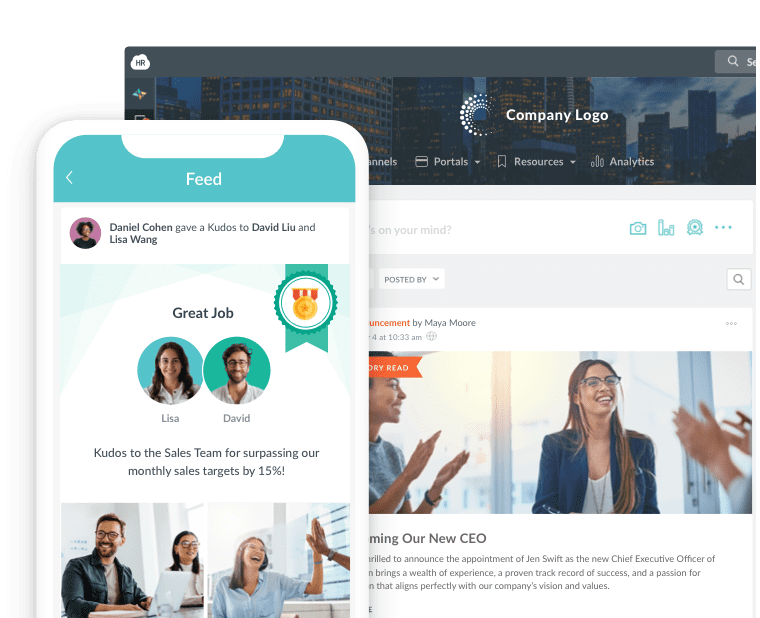
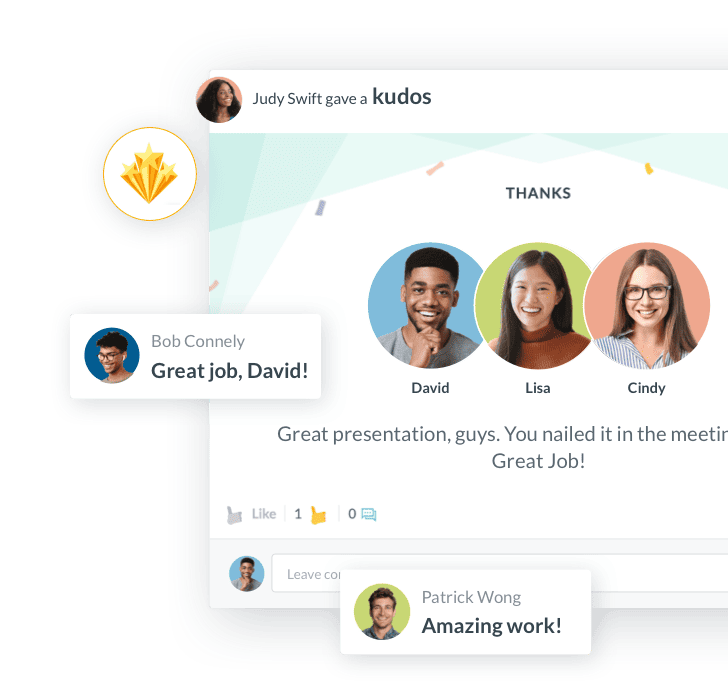
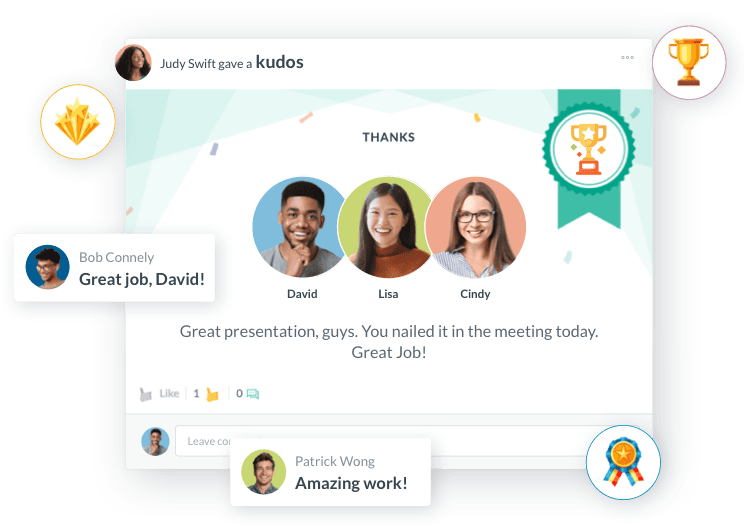
Author Bio:
This article is written by a marketing team member at HR Cloud. HR Cloud is a leading provider of proven HR solutions, including recruiting, onboarding, employee communications & engagement, and rewards & recognition. Our user-friendly software increases employee productivity, delivers time and cost savings, and minimizes compliance risk.
Keep Reading
Balancing Technology and the Human Touch in Employee Engagement
Companies are taking employee engagement very seriously because it is one of the ways of
Building Strong Teams: The Power of Team Bonding Exercises
Never overestimate the power of collaboration as a core element of effective team
The Influence of Pets and Animals on Employee Engagement
In today’s constantly evolving workplace, companies are always looking for new ways to
Like What You Hear?
We'd love to chat with you more about how HR Cloud® can support your business's HR needs. Book Your Free Demo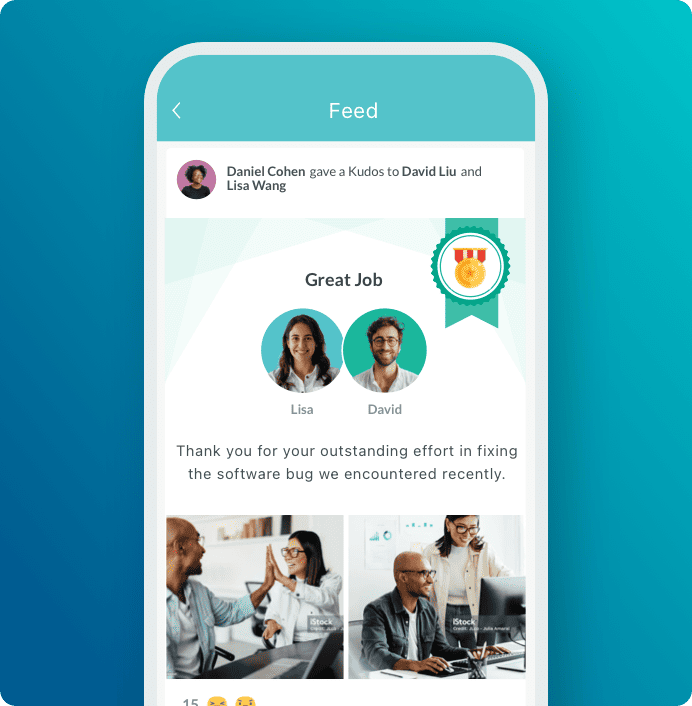
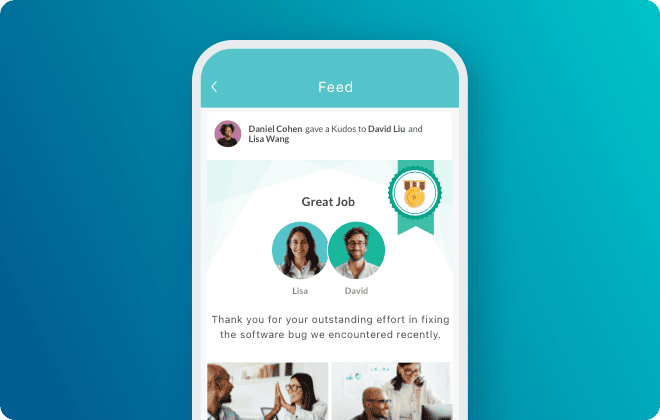
See Workmates in action
Your culture upgrade starts here. Take a quick tour or book a live demo.
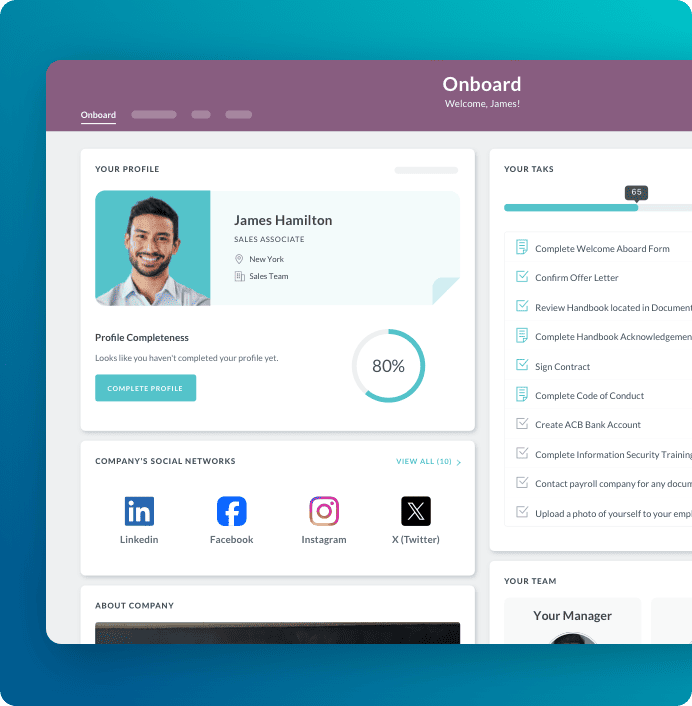
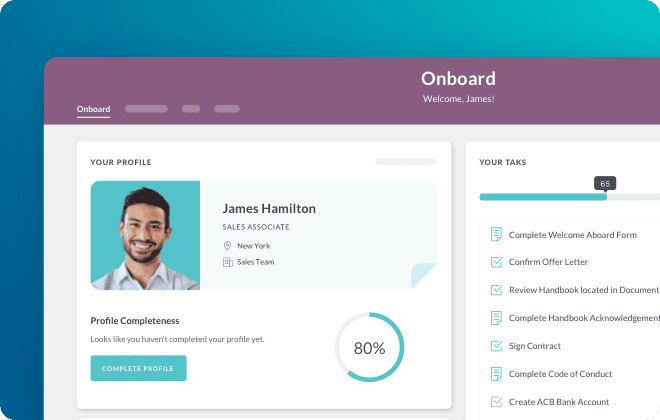
Cut onboarding time by 70%
See how growing teams streamline onboarding and save hours for every new hire.
